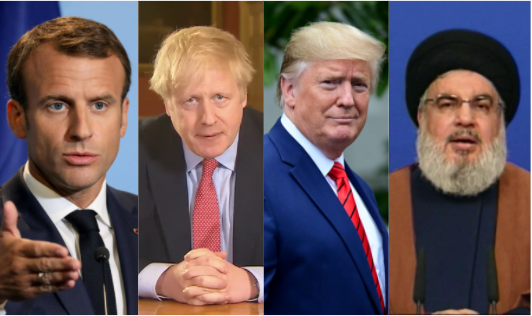The world is kicking Hezbollah out of Lebanon. And the Western world is using the collapsing Lebanese economy as a tool to coerce the pro-Hezbollah regime in Beirut to get rid of the anti-Israel militant outfit. The message to the Lebanese government from the West is loud and clear- kick Hezbollah out of your country, if you want any financial aid.
As per Foreign Policy, all the Western powers- the United States, Germany, the United Kingdom and France have vowed to reach out directly to the Lebanese people for post-Beirut blast reconstruction, effectively skirting around the Lebanese government. The West is not reaching out to the Lebanese government, even though the Lebanese economy has been reeling for quite some time and has virtually come crashing down after the Beirut blast.
French President Emmanuel Macron, who has been the most popular face in Lebanon since the Beirut blast, hosted a virtual donors’ conference along with the United Nations. The conference managed to gather 300 million US Dollars as the first tranche of aid for the victims of the Beirut blast that left 170 dead, thousands injured and millions homeless.
Macron has insisted that the financial aid should reach directly to the Lebanese people and not end up in the pockets of allegedly corrupt politicians. He said, “We must act quickly and efficiently so that this aid goes directly to where it is needed.”
The United States is following a similar strategy of bypassing the Lebanese government while rendering financial assistance to a crisis-ridden Lebanon. The US Embassy disclosed that the US Agency for International Development has supplied emergency medical kits each containing “enough medicine and medical supplies to support 60,000 people.” But the medical kits have directly reached the hospitals, rather than going through the Lebanese Ministry of Health.
The way the Western and European world has bypassed the Lebanese government comes as a real shock for Lebanon’s political, bureaucratic and elitist sections. The Lebanese economy isn’t just in a bad shape, but it is virtually done and dusted. The Lebanese government is, of course, desperate for Western aid.
In a way, the Lebanese government is being punished for the Hezbollah influence that has crept into the system. While the pro-Hezbollah Hassan Diab government resigned after the Beirut blast, pushing Hezbollah out of Lebanon isn’t as easy. The fact remains that every speck of the Lebanese government, including the Permanent Executive, is influenced by the pro-Palestine, Iran-backed Hezbollah.
On the other hand, the Western world doesn’t only want Hezbollah’s influence to wane in Lebanon; rather it wants to completely obliterate Hezbollah’s presence in the crisis-ridden country. The pressure from the Western world seems to be working as well because the Lebanese government has started weighing its options.
According to the latest reports, the Lebanese President Michel Aoun has hinted at the possibility of a peace dialogue with Israel. The Lebanese President did not rule out peace negotiations with Tel Aviv during an interaction with France’s BFM TV.
If a truce between Lebanon and Israel works out, it would eventually turn out to be a major jolt for the Hezbollah, and by necessary implication, the Palestinian cause would get further sidelined while Tehran’s influence in the Middle East would also suffer another death blow.
In the past few days, two geopolitical developments have therefore changed West Asia permanently- firstly, the Beirut blast that mobilised palpable anti-Hezbollah sentiment in Lebanon and secondly, the “full normalisation of relations” between the UAE and Israel.
These two developments have made the Palestine issue secondary and have also mainstreamed Israel in the Arab Muslim world. In fact, Israel’s Intelligence Minister Eli Cohen has suggested that Bahrain and Sudan are also likely to make peace with Israel. Such developments would further prompt the Lebanese government to snub the Hezbollah and make peace with Israel.
Hezbollah has for many years enjoyed safe havens in Lebanon. From here, the Iran-sponsored militant group has been able to keep the Middle East on the boil by constantly weaponizing one of the most contentious issues in the region. However, the new geopolitical developments mean that the Hezbollah and others who kept the Middle East burning are fast collapsing. The Middle East is moving towards peace in its own interest and also for the larger global interest.
